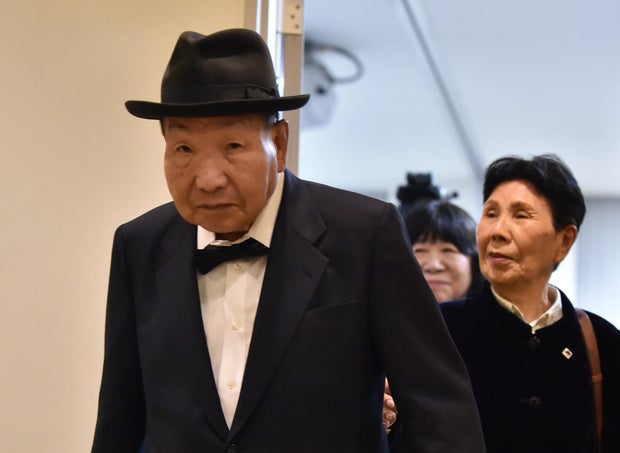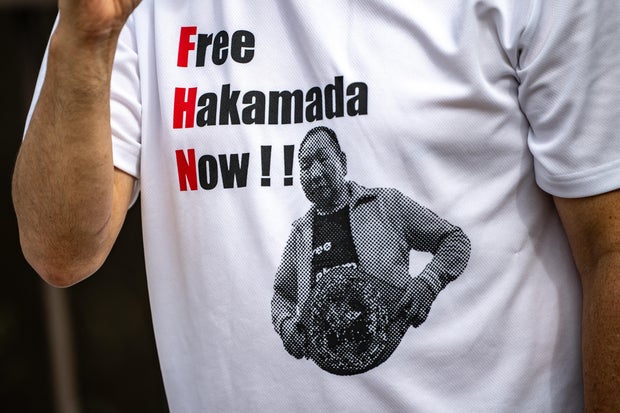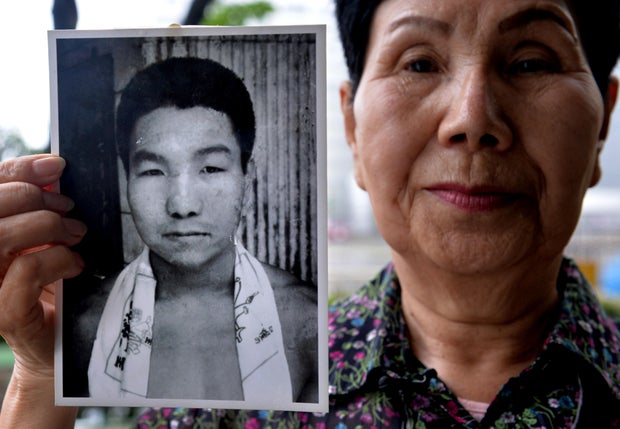World’s longest-serving death row inmate, 88-year-old former boxer, acquitted of 1966 murders in Japan

A Japanese court ruled Thursday that an 88-year-old former boxer was not guilty in a retrial of a quadruple murder in 1966, overturning an earlier ruling that made him the world’s most famous boxer. the longest-serving death row inmate.
Iwao Hakamada Acquitted The verdict by the Shizuoka District Court makes him the fifth death row inmate to be found not guilty in a retrial in Japan’s postwar penal system. The case could reignite debate over whether to abolish the death penalty in Japan.
Presiding judge Koshi Kunii said the court had acknowledged multiple fabrications of evidence and that Hakamada was not the culprit, Hakamada’s lawyer said.
After the two-hour full explanation of the judgment that followed the main sentence, his sister Hideko Hakamada, 91, emerged from the courthouse with a big smile, greeted by cheers and two large bouquets to celebrate her brother’s acquittal after a 58-year legal battle.
KAZUHIRO NOGI/AFP via Getty Images
“Thank you all, (the victory) is thanks to your support,” she said. “Thank you very much for supporting us for so long.”
Hakamada was convicted of murdering a company director and three members of his family in 1966 and setting fire to their home in central Japan. He was sentenced to death in 1968, but was not executed because of lengthy appeals and retrial procedures in Japan’s notoriously slow criminal justice system, where prosecutors have a 99 percent conviction rate.
He spent 48 years behind bars, including more than 45 on death row, making him the longest-serving death row inmate in the world, according to Amnesty International.
“We are delighted by the court’s decision to exonerate Iwao Hakamada,” Boram Jang of Amnesty International said in a statement. “After enduring nearly half a century of wrongful imprisonment and another ten years of waiting for his retrial, this verdict is an important recognition of the profound injustice he suffered for most of his life.”
It took 27 years for the Supreme Court to reject his first appeal for review. His second appeal for review was filed in 2008 by his sister. Hakamada was released from prison in 2014 when a court ordered a retrial based on evidence suggesting his conviction was based on fabricated charges by investigators, but he was not acquitted of that conviction. He was allowed to await his retrial at home because his fragile health and age made him unlikely to escape. Then, in 2023, the court finally ruled in his favor, paving the way for the latest retrial that began in October.
“I have nothing to do with this case… I am innocent,” he wrote in a letter to his mother at his trial in 1967. He apologized for upsetting his family and friends, but said he was confident he could prove his innocence.
After his death sentence, he expressed his fear of death and his anger at having been falsely accused.
“When I fall asleep every night in a silent solitary confinement cell, I sometimes cannot help but curse God. I have done nothing wrong,” he wrote to his family. “What a cold-blooded act to subject me to such cruelty. We do not need such a God. I am tempted to shout this to God,” Hakamada wrote in one of his letters.
Hakamada, whose Christian name is Paulo, was invited to a mass in Tokyo during Pope Francis’ visit in 2019, five years after his release.
PHILIP FONG/AFP via Getty Images
Supporters say Hakamada’s nearly half-century of imprisonment took a toll on his mental health. For the first two months after his release, he would wander around the apartment without even trying to go outside, his sister said. He spent most of his 48 years behind bars in solitary confinement, fearing execution.
One day, Hakamada’s sister asks him to help her with the shopping so that he agrees to leave the house. Going out for a walk then becomes his daily routine, even if today he has less means and he goes out by car, helped by his supporters.
At a final hearing at the Shizuoka court in May before Thursday’s ruling, prosecutors again sought the death penalty, sparking criticism from human rights groups who say prosecutors are trying to drag out the trial.
The extremely high hurdles facing new trials have also prompted legal experts to call for an overhaul of the system.
During the investigation that followed his arrest, Hakamada initially denied the accusations, before confessing. He later said he was forced to confess during a violent police interrogation.
One of the main points of contention involved five bloodstained garments that Hakamada was wearing at the time of the crime and that he had hidden in a vat of fermented soybean paste, or miso. The garments were found more than a year after his arrest.
A 2023 Tokyo High Court ruling acknowledged scientific experiments that found clothes soaked in miso for more than a year become too dark for bloodstains to be detected, pointing to possible fabrication on the part of investigators.
Defense attorneys and previous rulings in the retrial said the blood samples did not match Hakamada’s DNA and that the pants prosecutors presented as evidence were too small for Hakamada and did not fit when he tried them on.
A “revolutionary” decision
On Thursday, a Shizuoka District Court judge concluded that clothes soaked in miso for more than a year would never show red blood stains, confirming experiments submitted by defense lawyers and calling it an “inhumane investigation” that led to forced confessions.
Hakamada’s lawyer, Ogawa, hailed the ruling as “groundbreaking” because it made clear that the prosecution had fabricated key evidence from the beginning. “I think this decision puts the case to rest. … We must now prevent prosecutors from appealing, no matter what.”
The attorney said he plans to appeal to district attorneys to demand that they not appeal, because it is technically possible to do so even if they no longer have anything to support their argument.
KAZUHIRO NOGI/AFP via Getty Images
Japan and the United States are the only two Group of Seven countries to retain the death penalty. A survey conducted by the Japanese government showed that an overwhelming majority of the public supports the death penalty.
In Japan, executions are carried out in complete secrecy, with prisoners not informed of their fate until the morning of their hanging. In 2007, Japan began releasing the names of those executed and some details of their crimes, but the information released remains limited.
According to Amnesty International, as of 31 December 2023, 107 of the 115 people on death row had had their death sentences finalised and “people on death row continued to be held in solitary confinement”.
Hideko Hakamada has devoted nearly half her life to proving her brother’s innocence. Before Thursday’s verdict, she said she was fighting endlessly.
“It is very difficult to get a retrial,” she told reporters in Tokyo. “Not just Iwao, but I am sure there are other people who were wrongly accused and are crying. … I want the criminal law to be revised so that retrials are more easily accessible.”
Last month, an Oklahoma city agreed to pay more than $7 million to former death row inmate who was exonerated after nearly 50 years in prison, making him the longest-serving inmate to be found innocent of a crime in the United States







